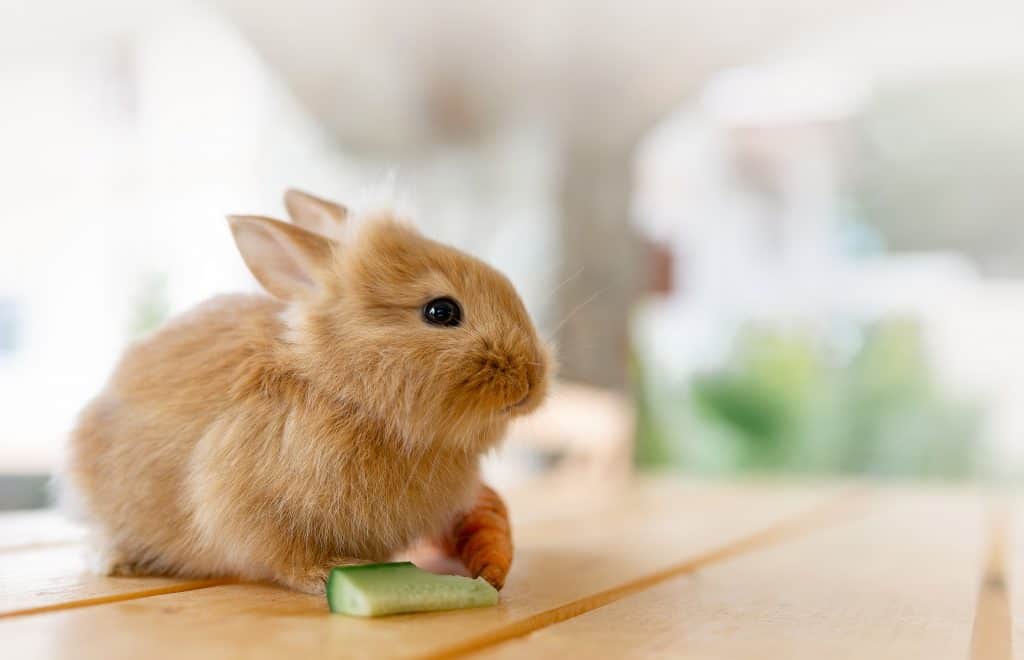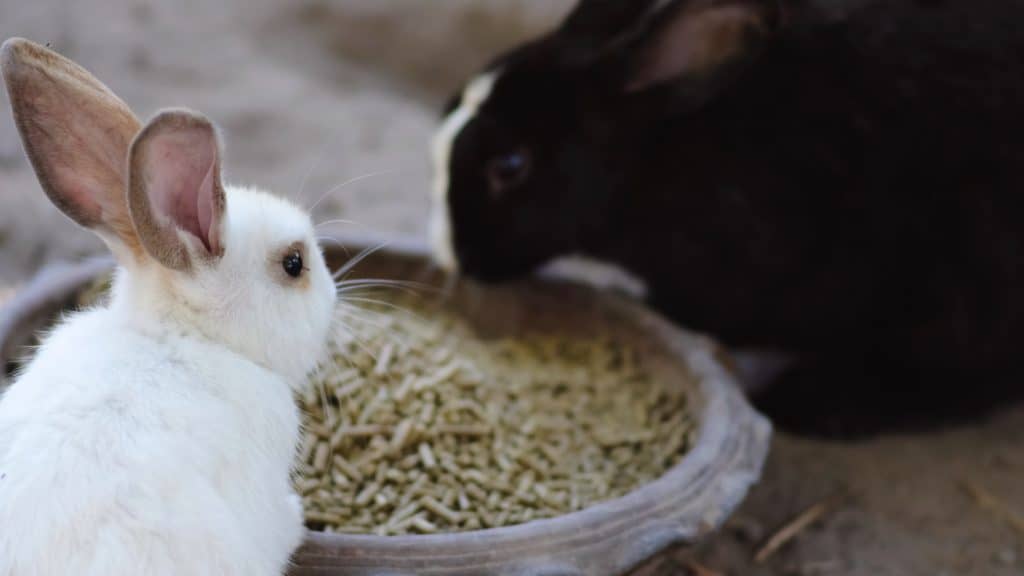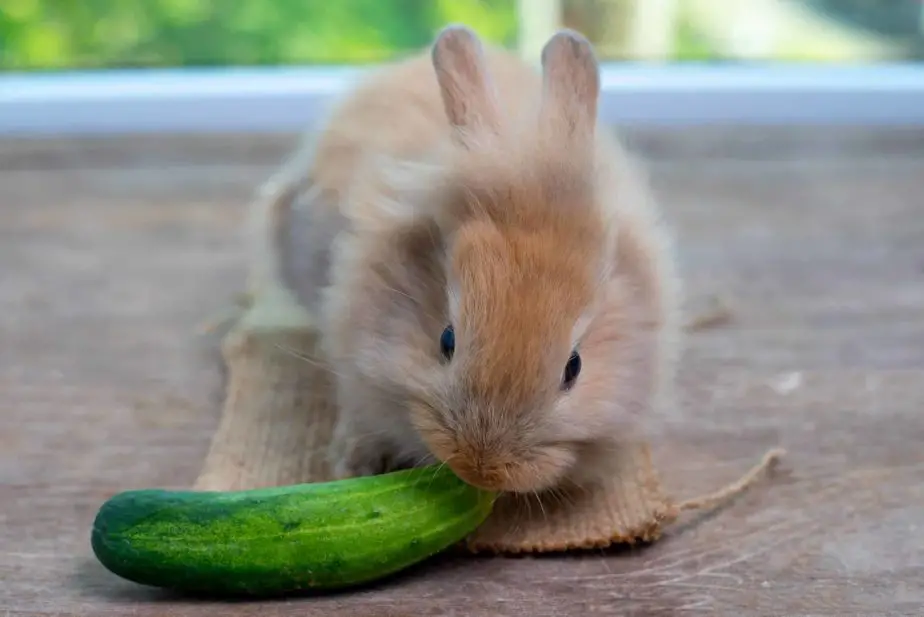As a rabbit owner, you are probably on the lookout for healthy wholesome snacks for your pet rabbit. Cucumbers may have come up on your radar since they are a vegetable that is generally available all year round. However just because something is considered healthy, it does not mean that it is automatically a good snack for your rabbit. So, if you are wondering “Can rabbits eat cucumber”, you have come to the right place. We will explore the suitability of this relatively common vegetable for rabbits.
Can rabbits eat cucumbers?
Yes, rabbits can have cucumbers. However, our advice is that like most vegetables that you choose to add to your rabbit’s diet, you should use it sparingly. As you know bunnies have pretty delicate constitutions. They have extremely sensitive digestive systems. If you feed rabbits too much cucumber, it may upset their intestinal balance and they may develop diarrhoea or loose stools.
So, if you are thinking of giving your rabbits cucumber, you should have a strategy. Here is the way that we introduce it:
- Wash your cucumbers thoroughly each time.
- Cut into slices. We recommend quarter-inch thick pieces.
- Feed your rabbit a teaspoon per 2 pounds of his body weight for the day.
- You should monitor your rabbit’s reaction to his new treat.
- If your rabbit appears develops loose stool or seems lethargic after this treat, stop feeding him the cucumber slices immediately.
- If your rabbit seems to be able to tolerate cucumber, you can give him this treat 2 to 3 times per week.
Additionally, you should always offer your rabbits fresh cucumber. You should serve them freshly cut slices. Never feed your rabbit any kind of processed cucumber. So, pickled cucumbers are definitely a no-no for rabbits. You have to remember pickled foods have additives of salt, vinegar and various other herbs and spices that are not healthy for rabbits.
Can rabbits eat cucumber skin?
Yes, cucumber peels are quite safe your bunnies. In fact, the skin is the most nutritious part of the cucumber. The skin can be a great addition to your rabbit’s fibre content. However, we recommend that you feed your rabbit the skin with bits of cucumber.

Can rabbits eat cucumber seeds?
Cucumber seeds also get the green light. These seeds are soft and can be handled quite easily by your bunny. So, if you are feeding your rabbits cucumbers there is no need to remove the seeds beforehand.
Can rabbits eat cucumber vines?
Yes, rabbits can eat the leaves of the cucumber plant safely. That’s to say that the cucumber vine is not toxic to rabbits. However, it does not appear to be a favourite of theirs. You see if you have a vegetable garden and have rabbits around. They do not usually gravitate toward cucumber leaves. This does not mean that you cannot use cucumber vines for your rabbit’s grass dietary requirement.
You can still cucumber leaves and stems, but you need to mix it with other grasses as well. It usually tastes great blended with the following grasses:
- Mint
- Turnip greens
- Spring greens
- Kale
- Escarole
- Carrot tops
- Cilantro
- Watercress
- Wheatgrass
- Basil
Usually, bunnies like when you combine about 6 different types of grasses. This way your rabbit gets to enjoy the taste several different flavours and textures. As such cucumber leaves can be offered more frequently than the vegetable itself.
What is the nutritional value of cucumbers?
It’s no surprise that cucumbers are healthy. They are low in carbohydrates, calories, fat and cholesterol. As such you do not need to worry about your rabbit putting on weight due to cucumber treats. This is always a concern since you should always try to help your rabbit maintain a healthy body weight. However, did you know that there is some debate regarding whether the cucumber is a fruit or a vegetable? It falls within the berry category which is a fruit. The truth is it is counted in both categories.
Even though cucumbers are predominantly water and fibre, they do contain vitamins and minerals that will help keep your bunny healthy.
Here is a list of some of the vitamins and minerals that your rabbit will get from a cucumber treat:
- Vitamin C – This vitamin strengthens bunnies’ immune systems and general wellbeing. It also appears to help stressed rabbits deal with their anxiety. However, rabbits cannot have too much vitamin C. Rabbits can actually produce their own vitamin C! Too much vitamin C may result in kidney problems for your rabbit.
- Vitamin K – Cucumbers are extremely rich in this vitamin. It is crucial for the bunny’s calcium absorption and overall bone health.
- Vitamin A – You can expect several health benefits for your rabbit from this vitamin. Vitamin A helps maintain healthy skin and bones. It keeps your rabbit’s eyes healthy and it is also essential for cell repair. Additionally, it has amazing antioxidant properties.
- Potassium – This mineral is essential for a healthy nervous system. It also helps keep your rabbit’s kidney healthy and functional.
- Magnesium – Your rabbit needs this mineral for heart and nerve health. It is also essential for blood sugar regulation and keeping your rabbit’s energy up.
- Manganese – As you know your rabbit has relatively fragile bones. Manganese helps keep your rabbit’s bones healthy and prevent osteoporosis.
- Silica – This particular mineral is vital for the healthy development of your rabbit’s skeletal and muscular structure. i.e. your tendons, muscles, cartilage, ligaments, and bones.
Do rabbits like cucumber?
Well, this depends on your rabbit. Some rabbits like cucumbers while others do not. It really depends on your bunny.
Can rabbits eat all types of cucumbers?
As you may be aware there are several types of cucumbers. All types are safe for rabbits. There are 2 types of cucumbers. There are slicing and pickling. You can tell the difference between the 2 types.
- Slicing – This cucumber is used for fresh eating. They can usually be identified by their smooth skin. They can grow up to 12 inches long.
- Pickling – These cucumbers are shorter and usually spiny in appearance. They have a lower water content, and some can be used for both slicing and pickling.
However, if you are intent on providing cucumbers as a treat, you may be willing to experiment. Here is a list of some of the types of cucumbers for your ease of reference.
Here the different type of Slicing cucumbers:
- Diva
- Early Pride
- Fanfare
- Long Green Improved
- Ashley
- Burpless #26
- Bush Champion
- Straight Eight
- Sugar Crunch
- Sweet Slice
- Sweet Success
- Dasher II
- Marketer
- Marketmore 76
- Muncher
- Poinsett 76
- Salad Bush
- Spacemaster
- Tanja
- Tendergreen Burpless
The Pickling cucumbers are listed below:
- Calypso
- Carolina
- Fancipak
- Homemade Pickles
- Little Leaf H-19
- National Pickling
- Parisian
- Pick a Bushel
- Picklebush
- Supremo
- Boston Pickling
- Burpee Pickler
- Bush Pickle
What should my rabbit’s diet consist of?
We have spoken about cucumbers and that they are indeed safe for your rabbits. However, you should always be mindful that rabbits’ diets should remain within these parameters:
- Hay/Grass -Your rabbit’s diet should consist of 80% hay. Fibre is essential for a healthy digestive system. You should ensure that your rabbit always has hay in his cage or hutch.
- Vegetables and Fruits – Rabbits get their vitamins and minerals from these food groups. You should endeavour to choose fruits and vegetables that are low in sugar content. These healthy choices keep obesity and other health issues at bay for your bunnies.
- Here is a list of some fruits with low sugar content that are ideal for rabbits:
- Star Fruit
- Apricot
- Currants
- Nectarine
- Apple (any type, no seeds or stem)
- Cherries (any kind, always remove the pits)
- Papaya
- Mango
- Berries (any type)
- Pineapple (Be sure to peel off the skin)
- Banana (peel off the skin (very small portions)
- Melons (the entire fruit) Pear
- Peach
- Plum (remove the pits)
- Kiwi
- Here are some other vegetables that can also be a welcomed addition to your rabbit’s diet:
- Cabbage (any kind)
- Broccolini
- Summer squash
- Zucchini squash
- Carrots
- Broccoli (stems and leaves)
- Edible flowers (hibiscus, nasturtiums, roses, pansies,)
- Celery
- Bell peppers (green and red)
- Chinese pea pods
- Brussel sprouts
- Here is a list of some fruits with low sugar content that are ideal for rabbits:
- Pellets – This is often optional for many pet owners. Pellets are made from hay and infused with calcium, protein and fat. It is meant to supplement your rabbit’s diet. However, if you think that your rabbit is getting what it needs from the fruits and vegetables, you do not have to use pellets. However, it should be noted that pellets are not a substitute for hay.

- Water – Always have fresh clean water in your rabbit’s water bowl. You should change it periodically throughout the day. Rabbits often run over their water bowls tracking debris.
As you can tell moderation is the key when it comes to cucumbers and your rabbits. They can have them, but they should only be offered as a treat. While a cucumber does have nutritional value you should give your rabbits slivers first and note their reaction. It may also be a matter of preference for your bunnies. If your rabbits do seem to like cucumbers, you have the green light from me!

